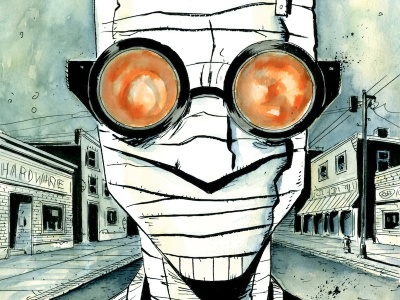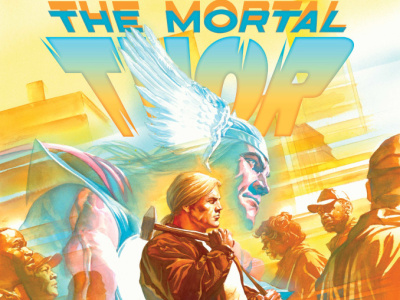Confessions of a Comic Book Guy is a weekly column by Steve Bennett of Super-Fly Comics and Games in Yellow Springs, Ohio. This week, Bennett looks at what the shutdown of Nickelodeon Magazine means for the future of comics:
It just goes to show you how much I know; in last week's column I advocated the creation of a Tintin Magazine; soon after came the announcement Nickelodeon Magazine was being cancelled. I can't tell you I was a regular reader but will confess I've picked up the occasional issue (strictly for review purposes you understand) of their spin-off publication Nickelodeon Comics and admired the contents. They had an A-list of alternative creators working for them, including Mark Martin, Kim Deitch, Sam Henderson, James Kochalka and Scott Roberts who did original Patty-Cake stories for them.
They produced comics as wildly imaginative as they were utterly modern and clearly the magazine had become a haven for freelance cartoonists who were given a lot of creative freedom as well as regular paychecks. So it's understandable if the usual suspect news Websites framed the story as being bad news for the cartoonists who'd lost a market. And while that's true, and certainly regrettable, there's another side to the story.
Falling circulation and advertising revenues were cited as reasons for its cancellation but more ominous ones have been given, like when the L.A . Times Blog said Nickelodeon Magazine "had lost value as a marketing tool in the age of Internet." Wikipedia mentioned "the declining influence of magazines for children and teenagers." And Nickelodeon television president Cyma Zarghami said in a company memo the company has "decided to exit the magazine business" at a time when print publications are "severely challenged." What I'm suggesting is all of that could apply to us.
In previous columns I've claimed "publishing is a mug's game unless you have deep pockets" and that Marvel and DC should use the magazine format to reach out to a potential new audience but Nickelodeon pulling out of publishing means the status quo has changed. I'm also on record as saying the comic book industry was a unique institution having things (like the direct sales market and hardcore collectors) that make it resistant to what plagues newsstand magazines. And I stand by that. That's resistant, not immune.
It's been noted elsewhere but John Turitzin, Marvel's general counsel and EVP of the executive office gave a presentation at the Cowen & Company 37th Annual Technology, Media and Telecom Conference. When the recent price increase to $3.99 on select titles came up he said, "We're just looking to maximize our profits for that business while not alienating our own fan base by making them feel that they're being gouged".
That "maximize profits" line didn't win Mr. Turitzin any fans among the fans but of course you have to put his comments in context; he was talking to Marvel investors not Wizard. Though a price hike in the middle of a recession is badly timed it's undeniable the cost of just about everything has gone up. And frankly charging more for popular titles instead of titles you suspect won't be popular, where the higher price could be another factor why they underperform makes a certain amount of sense.
But raising the price by an entire dollar (not in less painful increments of a quarter or fifty cents like in the old days) when print publications are "severely challenged" seems incredibly shortsighted. It seems tantamount to admitting we don't have enough new readers coming in to sustain a lower price so we might as well charge the ones we have as much as we can get away with. It's not like the fans are going anywhere.
I predicted that we'd start seeing customers dropping titles once we shot past the $3 price break for a regular comic book but so far no one at Super-Fly Comics has flinched at paying $3.99. This should be good news but there's a problem, besides the fact that Marvel and DC might misconstrue this as evidence they aren't charging enough. It's that publishers aren't thinking about the future, the day when the cover price gets too high and the circulation too low to sustain the direct sales market.
Or maybe they have and we're just not in it. Make no mistake, we are not irreplaceable; the direct sales market may have once saved the comic book industry but we were only a stopgap measure, something put in place until something better comes along. And it has, it's called the Internet, and while it's true people are still trying to work out a commercially viable business model for a lot of ventures Marvel Digital Comics Unlimited seems to be doing ok. Well enough to offer new and renewing subscribers a premium anyway, "an exclusive, all-new Hasbro Marvel Universe Nick Fury action figure!"
I'm not saying it'll be today, or tomorrow, but it is going to happen someday and probably sooner than we expect.
The opinions expressed in this column are solely those of the writer, and do not necessarily reflect the views of the editorial staff of ICv2.com.
Column by Steve Bennett
Posted by ICv2 on June 9, 2009 @ 11:16 pm CT
MORE TALK BACK
'How Would You Deal with This?'
April 15, 2024
Ralph DiBernardo of Jetpack Comics shares his frustrations on street release dates being ignored and the lack of consequences.
'We Need More Long-Term Thinking.'
November 30, 2023
In this Talk Back, Allen Berrebbi, Director of Business Development for Big Bang Comics, comments on the current state of the Direct Market and offers a couple of suggestions to help save it.
MORE COMICS
Story Inspired by H.G. Wells' 'The Invisible Man' Returns in Hardcover
July 3, 2025
First published by Vertigo, Lemire’s reimagining of the classic H.G. Wells novel The Invisible Man will return in a new hardcover edition.
From Marvel Comics
July 3, 2025
Check out the first three covers of the new series, which sees the God of Thunder reborn as a mortal.







